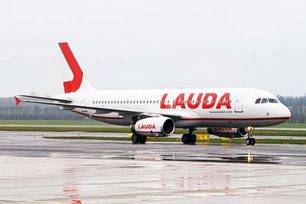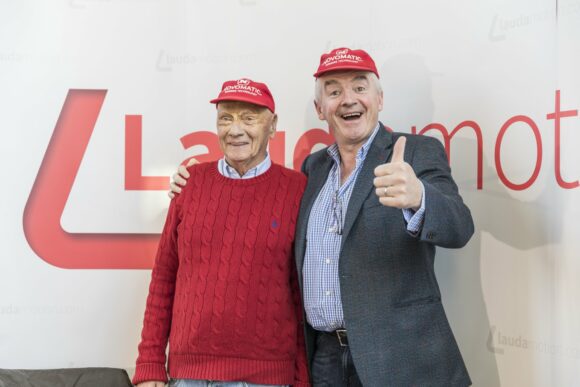
lAUDA2
At what price do you run a low-cost airline? And who will pay the price for a cheap ticket? Questions like this spring to mind when you follow the news around Ryanair’s Austrian subsidiary Laudamotion last week.
In a fight not untypical of CEO Michael O’Leary’s way of doing business, union vida has refused to give in to a 30 percent pay cut. The result: Laudamotion will close its Vienna base from May 29 at the cost of over 300 jobs.
A little bit of background first. Laudamotion used to be a business jet charter airline owned since 2016 by former Formula 1 world champion Niki Lauda, who had tried his luck in aviation with Lauda Air (later purchased by Austrian Airlines and Lufthansa Group) and Niki (later sold to airBerlin). When airBerlin went bust in late 2017, Niki continued for a while until it too went bankrupt.

Niki Lauda and Michael O’Leary celebrate the takeover of Laudamotion by Ryanair in March 2018. (Ryanair)
IAG almost bought the low-cost airline from Lauda, but when a court ruled that a purchase deal had to be negotiated through an Austrian and not a German court, Niki Lauda ended up the successful buyer. A month later in April 2018, he sold a 24.9 percent stake to Ryanair in a quick deal with O’Leary, followed by another 50.1 percent in August.
By December that same year, Ryanair had become the 100 percent owner with assets worth EUR 98.5 million. By then, Niki Lauda was in serious health trouble after a virus had infected his recently transplanted lungs. He passed away on May 20, 2019, aged 70.
Under Ryanair, Laudamotion was set to become its proud Austrian carrier in Vienna, one of Europe’s most competitive airports for low-cost carriers. Easyjet has established an Austrian subsidiary with an individual AOC to prepare itself for Brexit, IAG started a short-haul subsidiary of LEVEL out of Vienna, and Wizz Air has also gained a significant market share. This has confronted flag carrier Austrian with a tough ride as it reported a net loss for 2019. It announced a major restructuring that will cut even deeper since the Covid-crisis has hit it hard.
Laudamotion loss-making since the first day
In this market, Laudamotion has had its troubles too. The airline inherited six leased ex-Lufthansa Airbus A320s that proofed very costly and unreliable, hurting operational reliability. Lauda ended its first year of operations from March 2018 to April 2019 with an operating loss of EUR -172.5, a loss after tax of EUR -139.5 million, on revenues of EUR 134.5 million. Its FY19 annual report adds: “Ryanair also recognized EUR 15.8mln in a share of losses in associate prior to the consolidation of Laudamotion in August 2018, and recognized a deferred tax credit of EUR 43.2mln relating to the recognition of a deferred tax asset in respect of Laudamotion’s post-acquisition losses. The company projects the availability of sufficient future profits, to utilize these losses.
In June 2019, out went the Lufthansa A320s, in came 20 A320ceo’s on a lease of five years on average. The fleet currently stands at 26 and was set to grow to 35 aircraft by Summer 2020, operating out of Vienna, Dusseldorf, Stuttgart, and Palma de Mallorca. Laudamotion was expected to half its losses in its second year and become profitable in year 3.
O’Leary told Airinsight last year he was seriously looking at renewing the Airbus fleet with A320neo’s that even might find a way within the Ryanair group.
Rethinking Lauda strategy
This has panned out differently. Ryanair reported a net loss for Laudamotion in its recent FY20-results without specifying the amount. Despite earning EUR 6.4 million in revenues and flying ten million passengers, “Lauda underperformed in FY20 with fares lower than expected, due to intense price competition from Lufthansa subsidiaries in its core Austrian and German markets.” Losses reportedly have mounted at EUR 200 million.
Then Covid-19 struck, grounding all passenger flights in and out of Austria from March 17. “With costs running ahead of other Group airlines and Lauda’s main competitor, Austrian Airlines, expected to receive a EUR 800mln State Aid bailout, Lauda has had to completely rethink its strategy and significantly lower its growth plans. Its management team is implementing restructuring and cost-cutting plans and are currently in discussions with its people and its unions in relation to staff savings to secure the future of its Vienna A320 base.”
That’s when a hard fight with unions started, in particular with Gewerkschaft vida. Whereas Wirtschaftskammer Osterreich (WKO, representing the employers) supported the restructuring, and Laudamotion said that 95 percent of cockpit and cabin crew were accepting a pay cut, vida (which includes many members from Austrian Airlines) was having none of it. This despite O’Leary’s threats that a deal had to be reached by May 20 or the Vienna base would be closed from 30 May.
Even on the 20th – Niki Lauda’s first anniversary of his death – the two sides refused to blink. Under pressure and working in a “climate of fear” (quote: AustrianWings), staff has had a long and difficult relationship with its management. This includes threats, resignations, and a high level of illness.
As soon as a deal had expired, Ryanair confirmed its intention to close Vienna as of May 29, blaming vida for the loss of over 300 “well-paid” cockpit and cabin crew jobs as well as office jobs. In total, job losses could mount to 370.
Salary cut unacceptable to union
Vida has given a logical explanation for its position: the 30 percent salary cut imposed on Lauda’s staff is unacceptable. It calculated that a cabin crew member will earn a monthly salary of a net EUR 848. That’s below the EUR 917 which is the minimum income within the municipality of Vienna and far below the EUR 1.259 as Austria’s at-risk-of-poverty threshold.
“Apparently WK? is willing to accept this spiral of wage and social dumping”, vida’s negotiator Daniel Liebhart said, who used the term ‘blackmail’ to describe the situation. Liebhart also referred to the Covid-aid package in which the Austrian government pays the salaries for all staff members for up to six months.
From vida’s point of view, this standpoint is absolutely valid: the union has to stand by Austria’s social system that includes minimal salaries and social security. Unions in other countries have been here before: in Ireland, Germany, Spain, and The Netherlands they have tried to fight attempts by Ryanair to change or neglect terms of contracts and even national law. Despite a favorable ruling from a court, Dutch staff lost their jobs as Ryanair closed its Eindhoven base a few years ago.
Ryanair confirms its relentless tradition
As such, Laudamotion’s case confirms the relentless tradition in which Ryanair is doing business to maintain its position as Europe’s airline with the lowest costs per passenger. According to its own figures, this stood at EUR 31 compared to EUR 39 of its closest competitor Wizz by the end of March.
But this comes at a price for the airline’s workforce, a price the Austrian union wasn’t willing to pay any longer. Or as a commentator on Austrian TV put it: “Maybe we as consumers much think a bit better about how it is possible that an air ticket to Spain is cheaper than a taxi to the airport.”
As for Ryanair, it intends to take over the Vienna slots and operations itself. According to AustrianWings, the Irish company had already started recruiting staff for Vienna through an Irish office a week before the deadline to vida expired. Whether Laudamotion will have a viable future without the Austrian hub remains to be seen.
Views: 15



